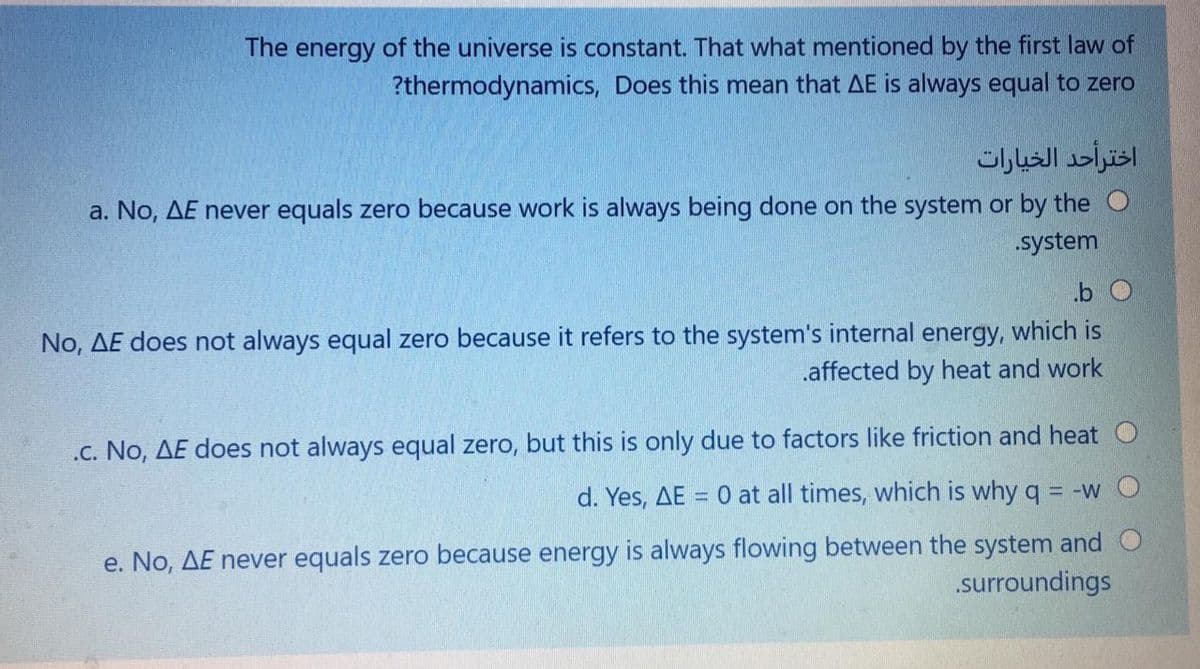The energy of the universe is constant. That what mentioned by the first law of ?thermodynamics, Does this mean that AE is always equal to zero اخترأحد الخيارات a. No, AE never equals zero because work is always being done on the system or by the .system .b No, AE does not always equal zero because it refers to the system's internal energy, which is .affected by heat and work .c. No, AE does not always equal zero, but this is only due to factors like friction and heat d. Yes, AE = O at all times, which is why q = -w O e. No, AE never equals zero because energy is always flowing between the system and O .surroundings
The energy of the universe is constant. That what mentioned by the first law of ?thermodynamics, Does this mean that AE is always equal to zero اخترأحد الخيارات a. No, AE never equals zero because work is always being done on the system or by the .system .b No, AE does not always equal zero because it refers to the system's internal energy, which is .affected by heat and work .c. No, AE does not always equal zero, but this is only due to factors like friction and heat d. Yes, AE = O at all times, which is why q = -w O e. No, AE never equals zero because energy is always flowing between the system and O .surroundings
Principles of Modern Chemistry
8th Edition
ISBN:9781305079113
Author:David W. Oxtoby, H. Pat Gillis, Laurie J. Butler
Publisher:David W. Oxtoby, H. Pat Gillis, Laurie J. Butler
Chapter12: Thermodynamic Processes And Thermochemistry
Section: Chapter Questions
Problem 13P
Related questions
Question

Transcribed Image Text:The energy of the universe is constant. That what mentioned by the first law of
?thermodynamics, Does this mean that AE is always equal to zero
اخترأحد الخيارات
a. No, AE never equals zero because work is always being done on the system or by the O
.system
.b O
No, AE does not always equal zero because it refers to the system's internal energy, which is
.affected by heat and work
.c. No, AE does not always equal zero, but this is only due to factors like friction and heat O
d. Yes, AE = 0 at all times, which is why q
= -W O
e. No, AE never equals zero because energy is always flowing between the system and O
.surroundings
Expert Solution
This question has been solved!
Explore an expertly crafted, step-by-step solution for a thorough understanding of key concepts.
This is a popular solution!
Trending now
This is a popular solution!
Step by step
Solved in 2 steps with 2 images

Knowledge Booster
Learn more about
Need a deep-dive on the concept behind this application? Look no further. Learn more about this topic, chemistry and related others by exploring similar questions and additional content below.Recommended textbooks for you

Principles of Modern Chemistry
Chemistry
ISBN:
9781305079113
Author:
David W. Oxtoby, H. Pat Gillis, Laurie J. Butler
Publisher:
Cengage Learning

Physical Chemistry
Chemistry
ISBN:
9781133958437
Author:
Ball, David W. (david Warren), BAER, Tomas
Publisher:
Wadsworth Cengage Learning,

Chemistry: Principles and Practice
Chemistry
ISBN:
9780534420123
Author:
Daniel L. Reger, Scott R. Goode, David W. Ball, Edward Mercer
Publisher:
Cengage Learning

Principles of Modern Chemistry
Chemistry
ISBN:
9781305079113
Author:
David W. Oxtoby, H. Pat Gillis, Laurie J. Butler
Publisher:
Cengage Learning

Physical Chemistry
Chemistry
ISBN:
9781133958437
Author:
Ball, David W. (david Warren), BAER, Tomas
Publisher:
Wadsworth Cengage Learning,

Chemistry: Principles and Practice
Chemistry
ISBN:
9780534420123
Author:
Daniel L. Reger, Scott R. Goode, David W. Ball, Edward Mercer
Publisher:
Cengage Learning

Chemistry for Engineering Students
Chemistry
ISBN:
9781337398909
Author:
Lawrence S. Brown, Tom Holme
Publisher:
Cengage Learning

Chemistry: The Molecular Science
Chemistry
ISBN:
9781285199047
Author:
John W. Moore, Conrad L. Stanitski
Publisher:
Cengage Learning
